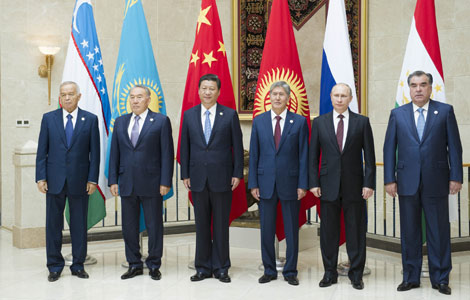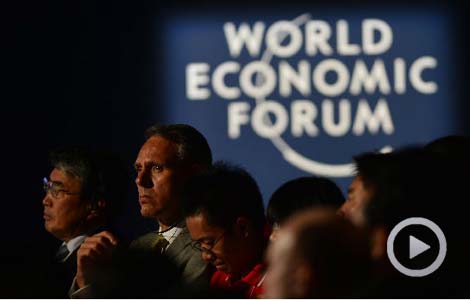End to QE to 'split' emerging markets
Updated: 2013-09-14 00:26
By WEI TIAN (China Daily)
|
||||||||
The United States plan to taper its quantitative easing policy will "split" emerging economies, with some — including China — better-placed to withstand the change while others will face currency depreciation and capital flight, experts said.
"QE tapering by the US will be the single biggest uncertainty for the world economy," Li Daokui, a professor at Tsinghua University and former adviser to China's central bank, said at the World Economic Forum's Annual Meeting of the New Champions 2013, known as Summer Davos, in Dalian, Liaoning province, on Friday.
The US Federal Reserve has signaled it may soon slow its $85 billion-a-month purchasing program of government bonds and mortgage-backed securities, which started in December.
Li said the move would mean at least $2 trillion in losses in capital markets globally and lead to capital flight and currency depreciation in emerging markets.
"The world economy will be full of drama in the next one or two years," Li said, adding that emerging economies such as Brazil and India may experience a financial crisis.
But when it comes to China, Li said it would sustain only a mild direct impact from QE tapering — and there might even be a slight positive effect.
"It will be good news for the renminbi, which can finally be freed from appreciation pressure," he said.
"China will be largely immune to the impact due to its sustained current-account surplus, low foreign debt, huge exchange reserves, high savings and capital controls," Lu Ting, China economist at Merrill Lynch, has written in an article.
That said, Li pointed out that QE tapering will "further split emerging economies".
He added that the concept of the BRICS (Brazil, Russia, India, China and South Africa) may vanish, leaving "just China versus other emerging economies".
A poll of more than 150 top executives at leading multinational companies by Boston Consulting Group found that China is still the most important market in their strategy over the next five years.
Richard Lesser, president and chief executive officer of BCG, said the gap between China and other emerging markets might even widen in the near future, because China's reforms are increasing confidence in its future, while other economies face uncertainties. For example, he said, in India there is even more uncertainty, and it's very complicated to do business.
"If the current leadership in India can step up and undertake the same kinds of reforms that the leadership here (in China) is talking about, we'll be very bullish about India, and I think companies will too," he said.
"Investors have been skittish since 2009, and any capital flow changes would make them nervous. But China's more insulated because it's a more internal financial system."
But on balance, he said, growth in developed economies also helps the entire world. The US, Japan and Europe being on a growth trajectory supports exports from other countries, which will also be a good thing.
"If the developed economies struggle, it will also put a damper here or there on emerging economies," he said.
Overall, QE tapering should not cause as much chaos as previous crises, experts said.
Li suggested that the process won't lead to another financial crisis similar to the one seen in 1997 to 1998 in Asia, because the world is better prepared with the guidance of the International Monetary Fund and the World Bank.
Zhu Min, deputy managing director of the IMF who was also present at he summit, agreed.
"The debt positions of emerging markets are in much better shape compared with 1998, and the strong net positions in terms of foreign exchange reserves are enough to withstand the crisis.
"If there is a short-term crisis in emerging economies, the IMF will surely lend a helping hand," he said, adding that emerging economies are still a major global growth engine.
Zhu also said that China shouldn't underestimate the external impact on its economy, as the country is now more correlated with the global economy, and opening its capital account may exacerbate this impact.

 Beijing backs truce bid in Syria
Beijing backs truce bid in Syria
 Parents support stricter rules on children's books
Parents support stricter rules on children's books
 Ouch ... bee therapy causes a real buzz
Ouch ... bee therapy causes a real buzz
 Faye Wong and Li Yapeng shock fans with divorce
Faye Wong and Li Yapeng shock fans with divorce
 World shows flare at Beijing tourism event
World shows flare at Beijing tourism event
 Yao Ming launches new wine
Yao Ming launches new wine
 'Up' comes to life
'Up' comes to life
 Experts discuss Chinese premier's economic plan
Experts discuss Chinese premier's economic plan
Most Viewed
Editor's Picks

|

|

|

|

|

|
Today's Top News
Obama welcomes US, Russia deal
Roundup: Xi's Central Asia trip aimed at common development, all-win cooperation
Senior Party official stresses ecological progress
China's top political advisor meets Vanuatu PM
Syrian opposition rejects U.S.-Russia deal on chemical weapons
Beijing backs truce bid in Syria
180 pupils sick on milk and cookies
Growth model shift beneficial for Europe, China
US Weekly

|

|






